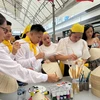Director of the Vietnam Institute of Culinary Reseach Dr. Han Nguyen Nguyen Nha launched a project entitled ‘Vietnamese Kitchen’ to bring Vietnamese cuisine to the world in 2009. Nha shared his thoughts on the country's cuisine on Nhan Dan newspaper.
Q: How do you think about the Vietnamese cuisine of the past and today?
A: In the past, Vietnamese cuisine was not popular. Today, the dishes of famous world cuisines such as European and Chinese comprise too many calories, causing serious diseases to eaters. Meanwhile, Vietnamese food with less fat, less meat and more vegetables is very beneficial for the health.
However, food hygiene and safety violation issues occur at an alarming level. If we can solve this problem, Vietnamese food will be more popular throughout the world.
I’m very optimistic about the country’s cuisine because numerous Vietnamese dishes appear at luxury restaurants and hotels - not only in Vietnam but also in foreign countries.
Q: In your opinion, what do we have to do to make the ‘Vietnamese kitchen’ popular in the world?
A: Firstly, we have to build the theories of the ‘Vietnamese kitchen’ to know about the unique identities of Vietnamese cuisine. Then, we can standardise Vietnamese food and restaurants, and establish culinary development companies like the Thai Royal Company which operates 8,000 restaurants around the world.
If Vietnamese food becomes popular around the world, it will bring many benefits to our country. If cuisine becomes a national brand, it will arouse national pride among Vietnamese people, contributing significantly to the country’s development.
Q: Why are Vietnamese restaurants in Europe and America becoming more popular?
A: Pho (Vietnamese noodle soup) and cha gio (sping rolls) are very popular in America and many European countries. Researcher Ivo Vasljep in the Czech capital of Prague is fascinated by Vietnamese foods that are not only delicious but also having healing effects.
The Chairman of the Republic of Korea (RoK) Food Science Association said many women in the RoK eat pho to prevent obesity. He also said that he had tasted many delicious Vietnamese dishes in all localities—from the north to the south.
Q: You launched the project ‘Vietnamese Kitchen’. So, how will it bring Vietnamese cuisine to the world?
A: The ‘Vietnamese Kitchen’ project focuses on building a theoretical framework on Vietnamese cuisine and a series of books entitled ‘Vietnamese Kitchen’. A collection of studies by culinary and cultural experts is the first phase of the project.
It also aims to standardise Vietnamese food and restaurants. The international symposium on promoting Vietnamese cuisine to the world held on April 10 and the restoration of the Hue royal court cuisine at the Ho Chi Minh City Tourism and Hotel School are important steps towards the standarisation, which will develop restaurants with clean food and clean kitchens.
Q: How do cooking classes contribute to the preservation and development of traditional dishes?
A: The preservation and development of Vietnamese traditional food require cooking classes and people who are dedicated to the country’s cuisine.
Bui Thi Cam Tho, who has a passion for cuisine, quit her high-income job at a telecommunications company and founded the Culinary Academy at 31 Vu Ngoc Phan street in Hanoi, which gives cooking classes lectured by culinary experts and professional chefs.
Young chef Nguyen Van Lap is collecting lost traditional recipes and restoring them. He has also registered the ‘Thousands of young people in 21st century’ programme that is training thousands of good chefs.
I believe that devoted people like Tho and Lap will contribute to the restoration of more than 3,000 traditional dishes, which will help Vietnamese cuisine become more popular.-VNA
Q: How do you think about the Vietnamese cuisine of the past and today?
A: In the past, Vietnamese cuisine was not popular. Today, the dishes of famous world cuisines such as European and Chinese comprise too many calories, causing serious diseases to eaters. Meanwhile, Vietnamese food with less fat, less meat and more vegetables is very beneficial for the health.
However, food hygiene and safety violation issues occur at an alarming level. If we can solve this problem, Vietnamese food will be more popular throughout the world.
I’m very optimistic about the country’s cuisine because numerous Vietnamese dishes appear at luxury restaurants and hotels - not only in Vietnam but also in foreign countries.
Q: In your opinion, what do we have to do to make the ‘Vietnamese kitchen’ popular in the world?
A: Firstly, we have to build the theories of the ‘Vietnamese kitchen’ to know about the unique identities of Vietnamese cuisine. Then, we can standardise Vietnamese food and restaurants, and establish culinary development companies like the Thai Royal Company which operates 8,000 restaurants around the world.
If Vietnamese food becomes popular around the world, it will bring many benefits to our country. If cuisine becomes a national brand, it will arouse national pride among Vietnamese people, contributing significantly to the country’s development.
Q: Why are Vietnamese restaurants in Europe and America becoming more popular?
A: Pho (Vietnamese noodle soup) and cha gio (sping rolls) are very popular in America and many European countries. Researcher Ivo Vasljep in the Czech capital of Prague is fascinated by Vietnamese foods that are not only delicious but also having healing effects.
The Chairman of the Republic of Korea (RoK) Food Science Association said many women in the RoK eat pho to prevent obesity. He also said that he had tasted many delicious Vietnamese dishes in all localities—from the north to the south.
Q: You launched the project ‘Vietnamese Kitchen’. So, how will it bring Vietnamese cuisine to the world?
A: The ‘Vietnamese Kitchen’ project focuses on building a theoretical framework on Vietnamese cuisine and a series of books entitled ‘Vietnamese Kitchen’. A collection of studies by culinary and cultural experts is the first phase of the project.
It also aims to standardise Vietnamese food and restaurants. The international symposium on promoting Vietnamese cuisine to the world held on April 10 and the restoration of the Hue royal court cuisine at the Ho Chi Minh City Tourism and Hotel School are important steps towards the standarisation, which will develop restaurants with clean food and clean kitchens.
Q: How do cooking classes contribute to the preservation and development of traditional dishes?
A: The preservation and development of Vietnamese traditional food require cooking classes and people who are dedicated to the country’s cuisine.
Bui Thi Cam Tho, who has a passion for cuisine, quit her high-income job at a telecommunications company and founded the Culinary Academy at 31 Vu Ngoc Phan street in Hanoi, which gives cooking classes lectured by culinary experts and professional chefs.
Young chef Nguyen Van Lap is collecting lost traditional recipes and restoring them. He has also registered the ‘Thousands of young people in 21st century’ programme that is training thousands of good chefs.
I believe that devoted people like Tho and Lap will contribute to the restoration of more than 3,000 traditional dishes, which will help Vietnamese cuisine become more popular.-VNA



















